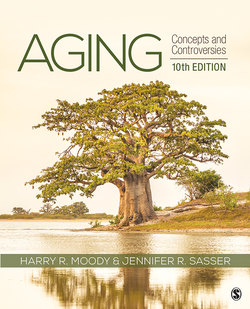Читать книгу Aging - Harry R. Moody - Страница 29
На сайте Литреса книга снята с продажи.
The Biology of Aging
ОглавлениеThe life course perspective on aging offers an optimistic view of possibilities open to older people. That view is sensible, given the prolongation of vigor among older people in our times. But will changes in aging go even further in the future? For instance, the film Cocoon (1985) tells the story of older adults who gain access to a drug that can reverse the process of aging and make them young again. In the movie, the audience has the experience of seeing older actors Don Ameche and Hume Cronyn grow young before their eyes. The film, of course, is science fiction. But it’s only the latest version of a recurrent hope as old as humanity: the search for the fountain of youth (Olshansky & Carnes, 2002). Sometimes the dream takes the shape of the “hyperborean theme”: a conviction that people in a remote part of the earth—for example, the Caucasus or the mountains of Peru—live extremely long lives. James Hilton’s (1933) novel Lost Horizon popularized the idea of an imaginary place called Shangri-La, which harbored the secret of longevity, and a movie based on the book had wide appeal.
But researchers have never found groups of people who live beyond the maximum lifespan. Scientists who have diligently examined the facts have failed to find any place on earth where people live beyond a human lifespan of around 120 years. Death remains a biological inevitability, and so far, we have not learned how to overcome the physiological limits that we know as aging. Could it be different? Perhaps, but it hasn’t happened yet.
The biology of aging remains one of the great unsolved mysteries of science. Scientists ask how the same process that leads to decline and death can be intrinsic to life. From an evolutionary point of view, aging poses a puzzle: How can a process of physiological decline—detrimental to the survival of organisms—actually be preserved by natural selection (Hayflick, 1996)? Biologists who study how aging takes place have accumulated a large body of knowledge, and experiments with lower organisms have proved that genetic and environmental manipulations can change life expectancy and maximum lifespan. Thus, scientists are now beginning to confront the question of whether it is possible to postpone, or even reverse, the process of biological aging (Scientific American Editors, 2013).
